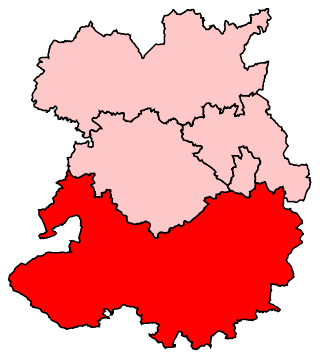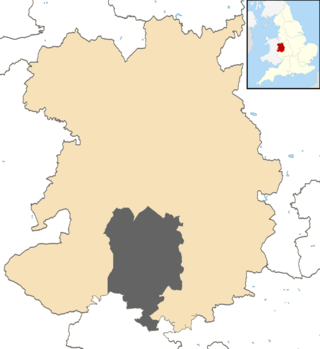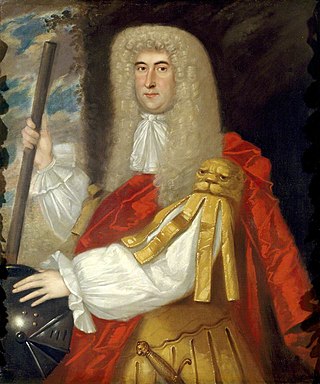Members of Parliament
- Constituency created (1468)
- Constituency abolished (1885)
| Much Wenlock | |
|---|---|
| Former borough constituency for the House of Commons | |
| 1290–1885 | |
| Replaced by | Ludlow |
Much Wenlock, often called simply Wenlock, was a constituency of the House of Commons of the Parliament of England until 1707, then of the Parliament of Great Britain from 1707 to 1800, and finally of the Parliament of the United Kingdom from 1801 to 1885, when it was abolished. It was named after the town of that name in Shropshire.
The seat was founded in 1468 as a borough constituency and was represented throughout its history by two burgesses.
Much Wenlock's constituency boundaries ran from Leighton to just west of Dawley, to Ironbridge, and finally to just east of Madeley along the northern border; travelling eastwards, the boundaries ran from just east of Madeley to the bend in the River Severn, following the river thereafter. The far southern border, commencing in the east, travelled along the southern part of the Severn across to Easthope; the western border, running northwards, going from Easthope through to Benthall, and onwards back to Leighton.
Weld-Forester was appointed Groom of the Bedchamber to William IV, requiring a by-election.
| Party | Candidate | Votes | % | ||
|---|---|---|---|---|---|
| Tory | George Weld-Forester | Unopposed | |||
| Tory hold | |||||
| Party | Candidate | Votes | % | ||
|---|---|---|---|---|---|
| Tory | George Weld-Forester | Unopposed | |||
| Whig | Paul Thompson | Unopposed | |||
| Registered electors | c. 500 | ||||
| Tory hold | |||||
| Whig hold | |||||
| Party | Candidate | Votes | % | ||
|---|---|---|---|---|---|
| Tory | George Weld-Forester | Unopposed | |||
| Whig | Paul Thompson | Unopposed | |||
| Registered electors | c. 500 | ||||
| Tory hold | |||||
| Whig hold | |||||
| Party | Candidate | Votes | % | ||
|---|---|---|---|---|---|
| Tory | George Weld-Forester | 448 | 41.3 | ||
| Tory | James Milnes Gaskell | 330 | 30.4 | ||
| Radical | Matthew Bridges | 308 | 28.4 | ||
| Majority | 22 | 2.0 | |||
| Turnout | 635 | 91.9 | |||
| Registered electors | 691 | ||||
| Tory hold | |||||
| Tory gain from Whig | |||||
| Party | Candidate | Votes | % | ±% | |
|---|---|---|---|---|---|
| Conservative | George Weld-Forester | 519 | 41.1 | −0.2 | |
| Conservative | James Milnes Gaskell | 422 | 33.4 | +3.0 | |
| Whig | William Somerville | 323 | 25.6 | −2.8 | |
| Majority | 99 | 7.8 | +5.8 | ||
| Turnout | c. 632 | c. 78.1 | c. −13.8 | ||
| Registered electors | 809 | ||||
| Conservative hold | Swing | +0.6 | |||
| Conservative hold | Swing | +2.2 | |||
| Party | Candidate | Votes | % | ||
|---|---|---|---|---|---|
| Conservative | George Weld-Forester | Unopposed | |||
| Conservative | James Milnes Gaskell | Unopposed | |||
| Registered electors | 906 | ||||
| Conservative hold | |||||
| Conservative hold | |||||
| Party | Candidate | Votes | % | ±% | |
|---|---|---|---|---|---|
| Conservative | George Weld-Forester | Unopposed | |||
| Conservative | James Milnes Gaskell | Unopposed | |||
| Registered electors | 961 | ||||
| Conservative hold | |||||
| Conservative hold | |||||
Gaskell was appointed a Lord Commissioner of the Treasury, requiring a by-election.
| Party | Candidate | Votes | % | ±% | |
|---|---|---|---|---|---|
| Conservative | James Milnes Gaskell | Unopposed | |||
| Registered electors | 949 | ||||
| Conservative hold | |||||
| Party | Candidate | Votes | % | ±% | |
|---|---|---|---|---|---|
| Conservative | George Weld-Forester | Unopposed | |||
| Conservative | James Milnes Gaskell | Unopposed | |||
| Registered electors | 857 | ||||
| Conservative hold | |||||
| Conservative hold | |||||
Weld-Forester was appointed Comptroller of the Household, requiring a by-election.
| Party | Candidate | Votes | % | ±% | |
|---|---|---|---|---|---|
| Conservative | George Weld-Forester | Unopposed | |||
| Conservative hold | |||||
| Party | Candidate | Votes | % | ±% | |
|---|---|---|---|---|---|
| Conservative | George Weld-Forester | Unopposed | |||
| Conservative | James Milnes Gaskell | Unopposed | |||
| Registered electors | 905 | ||||
| Conservative hold | |||||
| Conservative hold | |||||
| Party | Candidate | Votes | % | ±% | |
|---|---|---|---|---|---|
| Conservative | George Weld-Forester | Unopposed | |||
| Conservative | James Milnes Gaskell | Unopposed | |||
| Registered electors | 871 | ||||
| Conservative hold | |||||
| Conservative hold | |||||
Gaskell was appointed Comptroller of the Household, requiring a by-election.
| Party | Candidate | Votes | % | ±% | |
|---|---|---|---|---|---|
| Conservative | James Milnes Gaskell | Unopposed | |||
| Conservative hold | |||||
| Party | Candidate | Votes | % | ±% | |
|---|---|---|---|---|---|
| Conservative | George Weld-Forester | Unopposed | |||
| Conservative | James Milnes Gaskell | Unopposed | |||
| Registered electors | 881 | ||||
| Conservative hold | |||||
| Conservative hold | |||||
| Party | Candidate | Votes | % | ±% | |
|---|---|---|---|---|---|
| Conservative | George Weld-Forester | Unopposed | |||
| Conservative | James Milnes Gaskell | Unopposed | |||
| Registered electors | 961 | ||||
| Conservative hold | |||||
| Conservative hold | |||||
| Party | Candidate | Votes | % | ±% | |
|---|---|---|---|---|---|
| Conservative | George Weld-Forester | Unopposed | |||
| Liberal | Alexander Brown | Unopposed | |||
| Registered electors | 3,445 | ||||
| Conservative hold | |||||
| Liberal gain from Conservative | |||||
| Party | Candidate | Votes | % | ±% | |
|---|---|---|---|---|---|
| Conservative | George Weld-Forester | 1,708 | 41.4 | N/A | |
| Liberal | Alexander Brown | 1,575 | 38.1 | N/A | |
| Conservative | Charles Milnes Gaskell [6] | 846 | 20.5 | N/A | |
| Turnout | 3,283 (est) | 92.7 (est) | N/A | ||
| Registered electors | 3,541 | ||||
| Majority | 133 | 3.3 | N/A | ||
| Conservative hold | Swing | N/A | |||
| Majority | 729 | 17.6 | N/A | ||
| Liberal hold | Swing | N/A | |||
Forester succeeded to the peerage, becoming Lord Forester and causing a by-election.
| Party | Candidate | Votes | % | ±% | |
|---|---|---|---|---|---|
| Conservative | Cecil Weld-Forester | 1,720 | 55.1 | −6.8 | |
| Liberal | Beilby Lawley | 1,401 | 44.9 | +6.8 | |
| Majority | 319 | 10.2 | +6.9 | ||
| Turnout | 3,121 | 88.1 | −4.6 | ||
| Registered electors | 3,541 | ||||
| Conservative hold | Swing | -6.8 | |||
| Party | Candidate | Votes | % | ±% | |
|---|---|---|---|---|---|
| Liberal | Alexander Brown | 2,058 | 46.5 | +8.4 | |
| Conservative | Cecil Weld-Forester | 1,358 | 30.7 | −10.7 | |
| Conservative | Ralph Augustus Benson [7] | 1,013 | 22.9 | +2.4 | |
| Majority | 700 | 15.8 | −1.8 | ||
| Turnout | 3,244 (est) | 93.2 (est) | +0.5 | ||
| Registered electors | 3,481 | ||||
| Liberal hold | Swing | +1.5 | |||
| Conservative hold | Swing | −7.5 | |||
Baron Forester, of Willey Park in the County of Shropshire, is a title in the Peerage of the United Kingdom. It was created on 17 July 1821 for Cecil Weld-Forester, who had previously represented Wenlock in the House of Commons. Born Cecil Forester, he assumed the additional surname of Weld by royal licence in 1811. His son, the second Baron, also represented Wenlock from 1790 in Parliament, and later served in the Tory administration of Sir Robert Peel as Captain of the Honourable Corps of Gentlemen-at-Arms from 1841 to 1846.

Ludlow was a constituency in Shropshire represented in the House of Commons of the UK Parliament.
Reading was a parliamentary borough, and later a borough constituency in England, represented in the House of Commons of the Parliament of England until 1707, the Parliament of Great Britain from 1707 to 1800, and of the Parliament of the United Kingdom from 1801 to 1950 and 1955 to 1974. Until 1885, the constituency comprised the town of Reading in the county of Berkshire; after 1885, it was centred on the town but the exact boundaries differed.

Orlando George Charles Bridgeman, 3rd Earl of Bradford, PC, DL, styled Viscount Newport between 1825 and 1865, was a British courtier and Conservative politician. In a ministerial career spanning over thirty years, he notably served as Lord Chamberlain of the Household between 1866 and 1868 and as Master of the Horse between 1874 and 1880 and again between 1885 and 1886.
Eye was a parliamentary constituency, represented in the House of Commons of the Parliament of the United Kingdom, encompassing an area around the market town and civil parish of Eye, Suffolk.

South Shropshire is a county constituency in Shropshire. It was first created in 1832 and was represented by two Knights of the Shire.

Shrewsbury is a parliamentary constituency in England, centred on the town of Shrewsbury in Shropshire. It has been represented in the House of Commons of the Parliament of the United Kingdom since 2024 by Julia Buckley.
Bridgnorth was a parliamentary borough in Shropshire which was represented in the House of Commons of England from 1295 until 1707, then in the House of Commons of Great Britain until 1800, and in the House of Commons of the Parliament of the United Kingdom from 1801 until its abolition in 1885.
King's Lynn was a constituency in Norfolk which was represented continuously in the House of Commons of England from 1298 to 1707, in the House of Commons of Great Britain from 1707 to 1800, and in the House of Commons of the United Kingdom from 1801 until it was abolished for the February 1974 general election.
The Wellington to Craven Arms Railway was formed by a group of railway companies that eventually joined the Great Western Railway family, and connected Wellington, Shropshire and Shifnal, with Coalbrookdale, Buildwas, Much Wenlock and a junction near Craven Arms. Its objectives were dominated by the iron, colliery and limestone industries around Coalbrookdale.
Woodstock, sometimes called New Woodstock, was a parliamentary constituency in the United Kingdom named after the town of Woodstock in the county of Oxfordshire.
John George Weld Weld-Forester, 2nd Baron Forester PC, was a British Tory politician. He served as Captain of the Honourable Corps of Gentlemen-at-Arms under Sir Robert Peel from 1841 to 1846.

Cecil Theodore Weld-Forester, 5th Baron Forester, was a British peer and Conservative Member of Parliament, styled The Honourable from 1886 to 1894.
Haverfordwest was a parliamentary constituency. It returned one Member of Parliament (MP) to the House of Commons of the Parliament of the United Kingdom, elected by the first past the post system.
Wilton was the name of a parliamentary borough in Wiltshire. It was represented in the House of Commons of the Parliament of England from 1295 to 1707, then in the Parliament of Great Britain from 1707 to 1800 and finally in the House of Commons of the United Kingdom of the Parliament of the United Kingdom from 1801 to 1918. It had two Members of Parliament (MPs) until 1832, but from 1832 to 1885 only one member, as a result of the Reform Act 1832 where it also absorbed the former rotten borough of Old Sarum. In 1885 the borough was abolished, but the name of the constituency was then transferred to a new county constituency electing one Member from 1885 until 1918.
Brooke Forester was the long-serving Member of Parliament for the borough constituency of Wenlock from 1739 and 1768.
Sir William Forester KB, of Dothill Park, Apley Castle, and Watling Street in Wellington, Shropshire was a Whig politician who sat in the English and British House of Commons between 1679 and 1715.

Munslow is a hundred of Shropshire, England. It was formed with the amalgamation of the Anglo-Saxon hundreds of Patton and Culvestan during the reign of Henry I. Hundreds in England had various judicial, fiscal and other local government functions, their importance gradually declining from the end of manorialism to the latter part of the 19th century.

John Wolryche (c.1637–1685) was a lawyer and politician of landed gentry background who represented Much Wenlock in the House of Commons of England in two parliaments of Charles II. He was a moderate Whig, opposing the succession of James II but avoiding involvement in conspiracies.